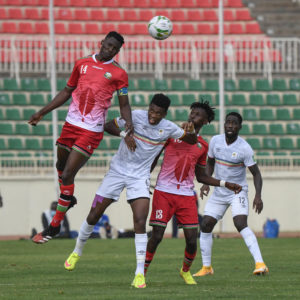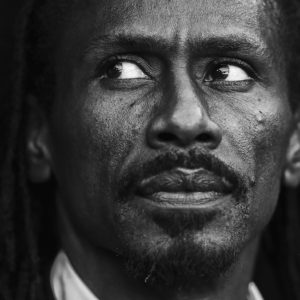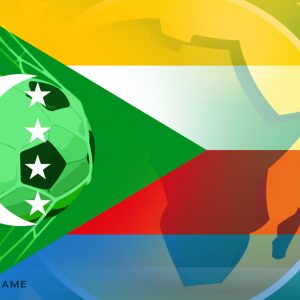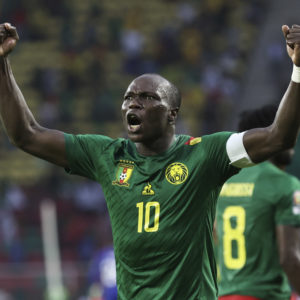A thundering success for Equatorial Guinea coach
Even though he has just taken the Nzalang Nacional to the Afcon quarterfinals after they failed to qualify for the previous two editions, Juan Micha has no plans to rest on his laurels now.
Author:
26 February 2022

Confidence is a central theme in the story of Juan Micha. The Equatorial Guinea coach uses the word a lot when he discusses his and the team’s transformation.
It’s through confidence that Micha beat the prejudice African coaches face when it comes to managing at the highest level. He passed it on to his players, who punched above their weight at the recent Africa Cup of Nations (Afcon) in Cameroon. The Nzalang Nacional, or National Thunder, reached the quarterfinals by overcoming a tough group that included Ivory Coast and Algeria. They went on to eliminate Mali in the round of 16 before losing to eventual champions Senegal in the last eight.
“I tried to get to the players’ hearts and minds so that they believed in themselves and in the work that we were going to do,” Micha said. “I made them understand that they are good like the others.”
Equatorial Guinea came to Cameroon on the back of a challenging year. Covid-19 destabilised the country’s domestic league and bureaucratic issues in the Equatoguinean Football Federation affected the team. “Every time we played, no matter the opponent, we always thought that we were going to lose before playing the game,” said Micha.
Having previously coached several men’s youth sides came in handy for Micha after his promotion from assistant coach. “When I arrived, I immediately went to speak to the younger players that I had discovered and brought to the team and to the older ones that I had been with in the 2015 Afcon.”
Related article:
Micha was initially considered a temporary solution. He was appointed as co-coach with Casto Nopo after a rocky start to the 2021 Afcon qualifying campaign that led to the sacking of French coach Sébastien Migné. The duration of Micha’s contract was uncertain and simply read “for the next games”. But he grabbed the opportunity and helped the team book their ticket to Cameroon. They pushed Tunisia in the 2022 World Cup qualifiers, with the north African side advancing to the play-offs only in the last round of matches after losing 1-0 to Equatorial Guinea in the penultimate match of the second round of qualifiers.
“I have had confidence since I started my career as a coach,” said Micha. “I trust my abilities and have the confidence that I’m able to take any responsibility. Being able to coach the national team was one of my goals and I had to be ready when the time for this came. This was the time to show that I can do well and even better [than expected].”
Micha eventually got the job full-time, becoming the first coach from Equatorial Guinea to be fully backed and trusted by the country’s football federation. “We all need opportunities,” said Micha. “We need people supporting and trusting in our projects. Having the chance to show our capacity is something that we all deserve. I had the support to work properly and I’m proud of the work I have done that was appreciated by many people in the country.”
Strong showing for African coaches
The 2021 Afcon had a strong representation of African coaches. Of the 24 men who led teams at the tournament, 15 were African, including eventual winner Aliou Cissé of Senegal. In the 2019 edition, there were only 11 African coaches among the 24 who went to Egypt. Two years before that, a paltry four coaches were at the tournament with its 16 teams.
Micha worked hard to get where he is. He was the first coach from Equatorial Guinea to obtain a Uefa pro licence, the highest certification in Europe. He started his coaching career in Spain’s second division with CF Fuenlabrada. In Madrid, he met the Argentine manager Esteban Becker and worked with him for two seasons before they went to Equatorial Guinea. The pair shared many experiences in the women’s and men’s national teams and contributed to the development of Equatorial Guinean football.
Becker and Micha’s role was to lead the training process of the young players and support them together with the rest of the technical staff. They also had the task of instructing the academies on the training of footballers and coaches. They prepared programmes and exercises for them and helped those who wanted to create an academy.
Related article:
According to Micha, most of the academies are still modest football schools run by people of goodwill who want to give direction to youths interested in playing football. There are some with more resources and their own facilities that have the opportunity to connect with other African as well as European clubs and send them players to try out. One of them is the Malabo-based Cano Sport Academy, which shaped many of the players who are now part of the national team.
“People understood that training young people from the earliest stages was great,” Micha said. “You can take the kids off the street so that they can learn a lot of things in the most delicate phase of their development. Nowadays, many young people pass through private and public academies and the school championship is also developing a lot.”
Homegrown success
The academies, which began to flourish in 2015, have been at the heart of developing local talent. As a result, the number of footballers born and raised in Equatorial Guinea who were called up for the Nzalang Nacional increased from only two at the 2012 Afcon to 11 this year.
In 2012, Brazilian coach Gílson Paulo counted on five Cameroonians, two Ivorians, a Spanish player of Cape Verdean origins and players from Brazil, Colombia, Liberia and Nigeria. Ten years later, the team had only two footballers with Cameroonian origins, Federico Bicoro and Manuel Sapunga, along with Madrid-born Marvin Anieboh, whose father is Nigerian while his mother is from Equatorial Guinea. It’s no longer possible for Equatorial Guinea to rely heavily on naturalised players because world governing body Fifa has tightened the naturalisation rules. This over-reliance on naturalised players prevented local footballers from improving.
“We worked to be able to introduce more and more players born and raised in the country,” explained Micha. “This has made our football and national team grow. It is a project that is really giving us sustenance and strength. Ten years have passed and we can see that this project has brought us results.”
Related article:
This has allowed Equatorial Guinean football to nurture the raw talent that was always there but not put to good use. “There is a lot of talent here, but few are interested in Equatorial Guinean football,” Micha said. “Perhaps it is because we are a small country and there is little information about our football, but our players are very good. They deserve to go abroad and become professionals.”
Even though he was one of the main promoters of developing local talent, when Micha started pushing his own project he looked for players with Equatorial Guinean origins abroad. That’s how Iban Salvador, the best Equatorial Guinean footballer at the 2021 Afcon, and all the others began to arrive.
The next step was to adapt the style of play to the men available. Since so many of them came from or played in Spain, Micha realised that Equatorial Guineans’ style of football was close to that of Spanish football. “They were those who colonised us and the first ones who taught us to play football,” said Micha. “The key was to enhance that style of play and continue with it.
“I wanted them to work on a kind of football in which they developed from childhood – a football that everyone can adapt to and that makes everyone grow. In the past, when our football level dropped, it was because we had brought a lot of people from other countries and our style had been lost.”
Drawing on strengths
On the other hand, Micha is aware that preserving the characteristic play of a country is necessary to succeed. “The main characteristic of Equatorial Guinean football, and African football in general, is strength,” said Micha. “This characterises us in Africa by nature. So I tried to keep this physical style and implement the tactical aspect. In other words, try to unite strength, tactics and also technique, which many already have and only have to improve. The three things can be related and give results.”
Equatorial Guinea have since taken a step forward and proved they can have their own identity. “This was possible also thanks to the players who understand a lot about football,” Micha said. “There is a lot of harmony between them and us from the technical staff. This gives us strength to continue on this path.”
Related article:
Vision and planning are fundamental, but none of this would have been achievable without Micha’s favourite word: confidence. “We shouldn’t discard the chance of bringing managers from outside because they can contribute a lot with their experience, but those [officials] who just look at the passport are wrong,” Micha said.
“Many African coaches have studied and learnt from experienced people. We just need opportunities and, most importantly, support when the opportunity is given. People have to wait and see what results we can bring with our projects [before judging]. We must have the same means that are made available to non-African coaches.”
This confidence is also what makes Micha aspire to achieve more. “Now I want to continue working as I have done so far,” he said. “With humility, rigour and sacrifice I aim to achieve the goals that every coach dreams of, such as winning an international tournament with my national team.”




